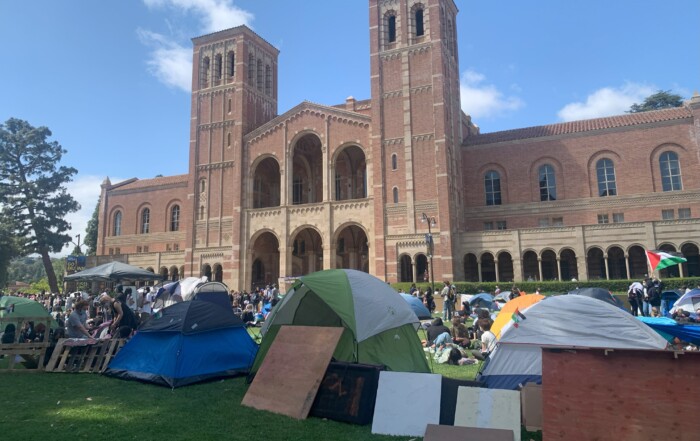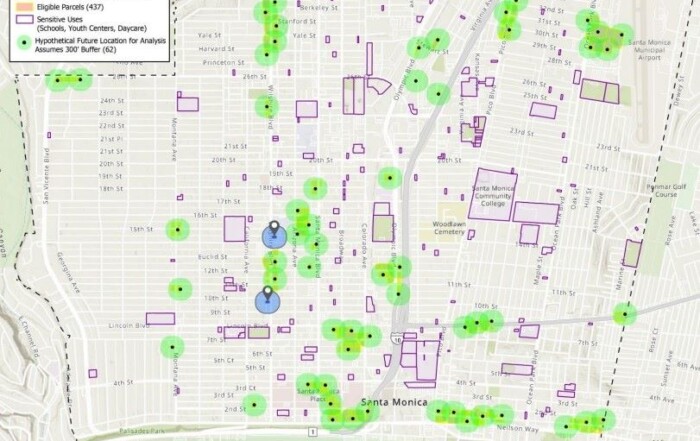Assemblymember Rick Chavez Zbur, who represents a portion of the Westside including Hollywood, West Hollywood, Beverly Hills, Westwood, and Santa Monica, has introduced multiple pieces of legislation this year. Let’s take a look at several of his bills:
California Retail Theft Reduction Act
On March 14, Assemblymember and Assembly Democratic Caucus Chair Zbur and Assembly Speaker Robert Rivas introduced the California Retail Theft Reduction Act to address retail crime across California.
The proposals were put together by the Assembly Select Committee on Retail Theft – chaired by Assemblymember Zbur – and are intended to advance balanced, effective, and meaningful solutions that address retail theft and preserve criminal justice reforms that have been effective at keeping communities safe.
“With the introduction of the California Retail Theft Reduction Act, we are demonstrating that the California Assembly has listened and that we are serious about addressing the problem of retail crime that is plaguing our communities,” said Assemblymember Zbur.
“Speaker Rivas asked the Retail Theft Committee to act expeditiously and we have advanced a comprehensive set of proposals that we believe will have a meaningful impact on stopping the growing threat of retail crime. This bill says to organized crime rings, ‘We mean business, and we are going to give law enforcement the tools they need to shut you down.’ To those who are engaging in shoplifting to survive, these proposals embrace new tools like enhanced supervision and diversion programs to help people get on their feet and move away from a life of crime. To the public, this bill demonstrates that the effective reform we need to protect our communities is on its way.”
The new bill does not need to be approved by voters and can be enacted by the Legislature and signed into law by the Governor.
Some key elements of the bill are:
- Comes with a penalty of up to three years for possession of stolen property with intent to resell. It also specifies that evidence of intent can include repeated conduct or possession of a quantity of goods inconsistent with personal use; does not require proof that a defendant acted with another person and applies both to the retail thieves and secondary sellers
- Specifies that the value of thefts can be aggregated to reach the threshold for grand theft
- Tackles the problem of fencing and distribution of stolen goods on online platforms. The bill will require online sellers to maintain records demonstrating the lawful chain of custody for those goods and will include other measures to prevent stolen goods from being advertised and sold unlawfully on online marketplaces
- Increases data transparency by requiring large retailers to report specified theft data while protecting retailers’ proprietary information
- Helps get at the root cause of theft by expanding the use of diversion and rehabilitative programs like drug court through increased supervision for shoplifting and petty theft, and the opportunity for early discharge from probation if the program is completed
- Expands tools for police to arrest for shoplifting based on a witness’s sworn statement or video footage of the crime
- Extends the ability of police to keep repeat offenders and those committing organized retail theft in custody
Jacqueline Marie Zbur Rare Disease Advisory Council
The bill, AB 2613, is named after Assemblymember Zbur’s late sister and aims to create a Rare Disease Advisory Council in California composed of experts and stakeholders across the rare disease community to serve as an advisory body to the legislature to develop policy recommendations.
Rare disease patients face unique challenges every day, from obtaining an accurate diagnosis and accessing medical specialists with knowledge of their condition to battling for access to quality care and therapies and receiving fair insurance coverage for their treatment and care.
“There are serious gaps in California’s social safety net that must be fixed,” said Assemblymember Zbur. “I’ve witnessed some of these firsthand after my sister Jacqueline Marie was diagnosed with ALS. For three years, until her death, I saw her face obstacle after obstacle to get the care she so desperately needed. And I know she’s not the only one.
With over 7,000 rare diseases affecting one in ten Californians, it is difficult for state policymakers and government officials to have an in-depth understanding of the issues faced by rare disease community members, and the resources needed to support them, according to bill text.
The plan for a Rare Disease Advisory Council (RDAC) in California would be to serve as a vital platform to amplify the voices of millions of Californians grappling with rare diseases. The council would engage with the Medi-Cal Drug Use Review Board, make recommendations for the improvement of Medi-Cal and state-regulated private health insurance, and identify areas of unmet need for research and opportunities for collaboration with stakeholders and RDACs in other states that can inform future RDAC work. This bill would also require the RDAC to submit a report of their work to the legislature.
AB 2650: CalFresh for Board & Care Facilities
The CalFresh for Board & Care Facilities bill, once amended, will aim to require the study of at-risk board and care facilities that are often at risk of closure due to financial burden and low government funding rates. It would provide services to some of California’s most vulnerable populations, including people experiencing mental health crises. Without these facilities, its residents would lose shelter and access to regular meals, leading to homelessness and hunger.
Currently, residents of board and care facilities do not qualify for Calfresh Benefits. AB 2650 would require the study of board and care facilities experiencing financial distress to determine if CalFresh benefits could stem the increasing closure of these facilities due to inadequate funding and to determine the estimated cost of CalFresh benefits in California.
AB 2704: Eliminating Barriers to In-Home Supportive Services Employment
In-home supportive services (IHSS) providers, including registry providers, play a crucial role in supporting home-bound aged, blind, and disabled individuals in California. Current law, Section 12305.86 of the Welfare and Institutions Code, mandates providers to pay for their criminal background checks, creating an inequitable burden on low-income workers.
Those background checks can amount to as much as $75, the equivalent of working four to six hours as an IHSS worker.
AB 2704, once amended to the Welfare and Institutions Code, will shift the responsibility of covering criminal background check costs to the county and away from job applicants.
Offshore Wind Energy Projects
AB 2208 will ask voters to approve a $1 billion bond for infrastructure improvements to eventually create electricity-generating turbine facilities in ports such as Long Beach.
Offshore wind is an essential part of the strategy to provide the cleanly generated electricity that California needs to meet its ambitious climate goals. While providing just a fraction of the necessary funding to upgrade in-state port infrastructure, the bond would signal that the state is committed to offshore wind and seeks to spur the public and private investment necessary to fund these port improvements fully.
The proposed wind farms would hold hundreds of giant turbines, each as tall as a skyscraper, or about 900 feet high.
“California will not meet its ambitious climate goals without offshore wind, and we need to invest in our ports to make offshore wind a reality,” said Assemblymember Zbur. “In order to meet our climate goals, the state must produce more than double the amount of electricity that we’re producing today. Offshore wind is a key part of what we must do to save our planet. To meet our climate goals, we need to produce enough offshore wind energy to power up to 25 million homes by 2045. “
On January 19, 2024, the California Energy Commission released its draft AB 525 Offshore Wind Strategic Plan, which includes, among other things, a plan to develop ports to support a range of floating offshore wind energy development activities, including turbine assembly, construction and fabrication of parts and foundations, operations, and maintenance.
Enhanced Consumer Protections for Preventive Care
A recent study found that as little as $10 in cost sharing for HIV prevention medication such as PrEP doubled the rate at which patients abandon their prescriptions, leading to a higher incidence of HIV infection.
Federal guidance under the Affordable Care Act requires health insurers and health plans to cover both recommended preventive care and health care that is integral to providing recommended preventive care without out-of-pocket costs.
AB 2258 would codify this federal guidance into California law. Those services include but are not limited to, anesthesia and polyp removal during a colonoscopy, placement, management, and removal of long-acting reversible contraceptives, as well as ancillary and support services for PrEP, including HIV and other STI screening.
Increasing Access to Gender-Affirming Care
In 2023, 185 bills passed nationwide to limit or eliminate access to gender-affirming health care.
According to an estimate by the William’s Institute, the pervasive wave of anti-LGBTQ+ legislation has particularly harmed transgender youth and approximately 156,500 transgender youth live in 32 states where access to gender-affirming care has been restricted.
AB 2442 would ensure that license applications for providers of gender-affirming care are prioritized to ensure a robust network of providers in the state are able to meet the needs of out-of-state patients.
Photo provided by the office of Assemblymember Zbur.
Stay informed. Sign up for The Westside Voice Newsletter
By clicking submit, you agree to share your email address with Westside Voice. We do not sell or share your information with anyone.








